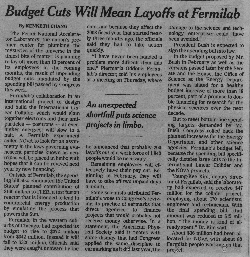Today, members of the three teams from the Fermilab, SLAC, and U.S. LHC users’ communities met at Fermilab to set the stage for a late April trip to Washington DC. We discussed many things; much of the morning was occupied by information intake, while the afternoon was devoted to method, practice, and discussion. We were very fortunate to be able to get input on the current stimulus plan, the FY09 and FY10 budgets from a cast of many viewpoints, including laboratory directors, government relations experts, and communications experts.
Many messages came from this meeting.One of the messages that really resonated with me pertained specifically to offices that make a statement of support for science. These offices can be challenging; you walk in, say what you’re there for, introduce yourself, and get blind-sided by the following statement: “We’re a big supporter of science; we recognize that science is important to the nation.”
What do you do? Do you simply end the conversation by thanking them or awkwardly finding more to talk about? Do you try to turn the conversation to specific items of interest to you, or them? You had all this speech prepared, ready to fight a great jet stream of resistance, and suddenly you find yourself riding a strong tail wind.
I’ve wrestled with this problem for years. Today, the answer became crystal clear for me: ask them to put their mouth where their mouth is, and ask for their advocacy in Congress. Specifically, members of Congress can show their support for an issue by making a “floor statement” about it. They can enter the floor of the Congress during general debate and make a short speech about science, science policy, funding, or the importance of science to the nation. The point is simply that if they really support science, then say it. Say it publicly, in front of their colleagues. Change agreeability into advocacy.
It seems so simple, in hindsight. But I must admit, the offices that claim to “get it” have always been troublesome to me. This clinches it. Ask them to act on it, and suggest ways they can do it.
Of course, do your damn homework before you ask such a thing. Have they already given a recent speech, or floor statement? Don’t demand something of them they already do! Even when faced with overwhelming support, be a good citizen and know what they have done (if you can). But here it is, plain as day . . .
You say you support science? Prove it.
I am reminded of a story about the great Roman orator, Cicero. So I was taught in my college Roman history class, Cicero was a great advocate of the destruction of Carthage. Twice before, Rome had faced the great Cathaginian empire in the Punic Wars. Twice before, they had contained Carthage. Cicero never felt this was enough.
What did he do? He executed floor statement advocacy of the highest form: he injected Carthage into every speech he gave to the Roman Senate. Be it a speech about agriculture policy, taxes, or a simple procedural motion, so the story goes, Cicero ended with the following three words: “Carthago delenda est.”
Cathage must be destroyed. Not just must. No, the Latin is more subtle than that. This phrasing implies that the very nature of Carthage was that it existed solely that it might be destroyed. Cicero wore his colleagues down; eventually, Rome launched a final offensive against the greatly weakened Cathaginians, razed Carthage to the ground, and salted the earth to insure the land was infertile to any who had ideas about rebuilding.
With three simple words, repeated over and over, Cicero contributed one of the most memorable floor statements in human history and sealed the story of Rome and Carthage.
I think we can learn from this. Even a simple statement, well-placed, by a supporter of science in front of their peers could change the fate of science funding in this nation. We need only call out for a champion, one who will incite a funding revolution, rebuild the great city of science in this nation, and sow the seeds of progress and prosperity through understanding, that all might flock to the U.S. once again as a beacon of leadership in science.



